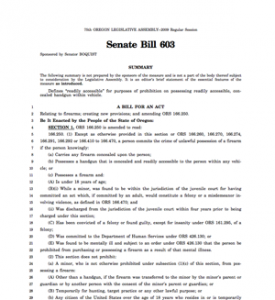Posted on June 17, 2013
 The Pennsylvania Senate Appropriations Committee passed expungement Senate Bill 391 on June 17, 2013. SB 391, sponsored by Tim Solobay, the Senator of Pennsylvania, amended Pennsylvania’s preexisting expungement law so that qualified offenders with low-level misdemeanor convictions can expunge their conviction after proving that they are rehabilitated and by satisfying the necessary waiting period.
The Pennsylvania Senate Appropriations Committee passed expungement Senate Bill 391 on June 17, 2013. SB 391, sponsored by Tim Solobay, the Senator of Pennsylvania, amended Pennsylvania’s preexisting expungement law so that qualified offenders with low-level misdemeanor convictions can expunge their conviction after proving that they are rehabilitated and by satisfying the necessary waiting period.
The current law does not allow offenders under 70 years old to expunge their Pennsylvania misdemeanor, regardless of how much time has passed since their misdemeanor conviction. In addition, the offender must wait until he or she is over 70 year of age and cannot have been convicted of an offense in over 5 years. Otherwise, the offender must wait until he or she has been dead for over three years.
While a posthumous misdemeanor expungement may exonerate the former offender, the absolution does not change the quality of life for the departed and does nothing for society. According to RecordGone.com expungement attorney Jenna Thorne, “this bill provides needed relief for many deserving people. It will also benefit the citizens of Pennsylvania, because the new law will help to reduce recidivism rates by allowing more former offenders to secure gainful employment and support themselves.”
Expungement for those with Second or Third Degree Misdemeanors
SB 391 will allow offenders who have second or third degree misdemeanors to apply for an expungement if he or she has not committed another offense within the given timeframe. Second-degree offenders must wait seven years to petition for an expungement, and third-degree offenders must wait ten years before petitioning.
Senator Solobay stresses the necessity for expungement reform stating that “this bill recognizes genuine efforts at rehabilitation; it makes sense for our justice system and it makes sense for taxpayers.” By allowing rehabilitated offenders the opportunity to expunge their misdemeanors from their criminal record, crime rates will reduce and unemployment will lower significantly.
SB 391 will enable former offenders to become self-reliable and contribute to society, rather than being forced into a continuous cycle of dependence as a result of being labeled a criminal, which will benefit both former offenders and citizens of Pennsylvania.
To find out more, read our previous article about senate bill 391.
Read More
 Per the United States Constitution, a Bill can become a Law once it has been introduced and approved through various government departments.
Per the United States Constitution, a Bill can become a Law once it has been introduced and approved through various government departments. On February 12, 2013, Senate Bill 391 was introduced by State Senator Tim Solobay and, if passed, will allow for more leniency in expungement law. The current Pennsylvania law stated that crimes other than summary offenses cannot be expunged until the offender turned 70 years old or has been deceased for more than three years. The new Bill would allow individuals who have misdemeanors of the 2nd and 3rd degree to apply to have their criminal records if they have not reoffended in ten years for 2nd degree misdemeanors, and seven years for 3rd degree misdemeanors.
On February 12, 2013, Senate Bill 391 was introduced by State Senator Tim Solobay and, if passed, will allow for more leniency in expungement law. The current Pennsylvania law stated that crimes other than summary offenses cannot be expunged until the offender turned 70 years old or has been deceased for more than three years. The new Bill would allow individuals who have misdemeanors of the 2nd and 3rd degree to apply to have their criminal records if they have not reoffended in ten years for 2nd degree misdemeanors, and seven years for 3rd degree misdemeanors.